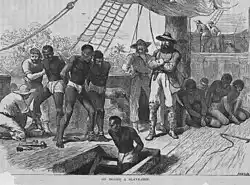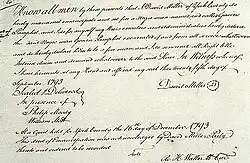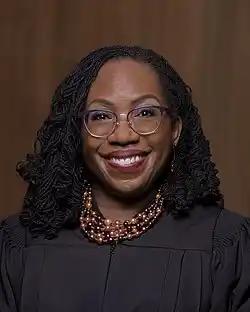
African American surnames are the surnames which people of African American ethnicity and heritage in the United States hold. The roughly 388,000 Africans who were brought to the Thirteen British Colonies and the subsequent United States between 1619 and the middle of the nineteenth century as part of the Transatlantic slave trade were generally given Anglophone names. These included surnames, ones which were overwhelmingly English, with some Scottish, Welsh and Irish surnames as well. Often these were the surnames of their owners or, in a slightly more benign development, the surname of a benefactor who had set them free or agreed to their manumission. Hence the most common surnames amongst the African American community in the United States today are not African-sounding surnames, but rather Anglophone surnames like Smith, Williams, Johnson, Brown and Jones.
History of African American surnamesHistory of African American surnames

It is widely understood that the first ships carrying slaves to what would become the United States arrived to Virginia in 1619. Over the next two centuries, down to when the trade in slaves into the United States was prohibited early in the nineteenth century (though not the institution of slavery itself), some 388,000 people were transported into the country. Some were brought from the Caribbean and other parts of the Americas, though most came directly from western Africa.[1] Although there were some surname traditions already in West Africa by this time, slaves in the US were denied both their first names and their surnames. Instead they were given new first names by their owners or the slave-traders who sold them, these typically being English, Scottish, Welsh or Irish names, or in some instances more eccentric names. For instance, it is common in old records to see slaves with names from classical Greek and Roman history such as Nero, Caesar and so forth.[2]
Often slaves did not have surnames while they were in bondage. Most slave-owners were smallholders with average sized farms and would not have more than a handful or a dozen slaves. In such scenarios they did not need to give their slaves surnames in order to disambiguate between them. Slaves only really began to acquire surnames in large numbers from the middle of the eighteenth century onwards as more and more slaves were freed or manumitted (earned their freedom through a set number of years of labor). This process increased from the 1770s onwards as many northern states became ‘free states’ and prohibited slavery, a process which increased exponentially in the nineteenth century and climaxed in the 1860s as a result of the American Civil War.[3]
As all of this occurred slaves needed to adopt surnames so that they could be recorded more precisely in censuses and other official records. By this time most slaves were third, fourth, fifth, sixth or even seventh generation slaves and their links back to Africa were firmly sundered. Accordingly, they did not choose to adopt African-sounding surnames, though some did pick African first names.[4] Instead most adopted the surnames of their former owners, a benefactor who had helped earn their freedom or simply a surname which was in common usage and which they picked from a range of many available. This was not always a free choice of theirs. Often it was their former owners who might be setting them free or a local official who was handling the paperwork associated with their manumission that picked their surname, the simple reason being that most slaves were illiterate and so the process of legally enfranchising a former slave necessarily involved Anglophone bureaucrats.[5]
Although the number of slaves who were brought to the United States was around 388,000 down to the middle of the nineteenth century, over time, through natural increase, the African American community has swelled to an estimated 50 million people. This means that more than 15% of the population of the United States has African American surnames and this very large figure has ensured that Anglophone surnames like Smith, Brown, Johnson, Williams and Jones have remained the dominant surnames in the United States, despite the huge influx of Italians and other ethnic groups to the country from the mid-nineteenth century onwards.
Most popular African American surnamesMost popular African American surnames
The most popular African Americans surnames according to recent United States censuses are as follows:
- Williams – The most common African American surname in the United States, with over three-quarters of a million people holding it.
- Johnson – The second most common African American surname, with upwards of 700,000 people holding this patronymic surname which basically means ‘son of John’.
- Smith – This occupational surname, first used to describe a person who was a blacksmith or metalworker of some kind, is the most common surname in the United States overall, but the third most common African American surname.
- Jones – The fourth most common African American surname is largely of Welsh origin.
- Brown – The fifth most common African American surname, held by over half a million black Americans.
- Jackson – The sixth most common, with just under 400,000 African Americans bearing this surname.
- Davis – The seventh most common African American surname is also ultimately of Welsh origin.
- Thomas – The eighth most common African American surname.
- Harris –The ninth most common African American surname, held by over a quarter of a million people of African American ethnicity in the US.
- robinson – The tenth most common African American surname, something which contrasts with it only being approximately the thirtieth most common surname in the United States as a whole.[6]
Famous African AmericansFamous African Americans

- Harriet Lummis Smith – The first African American woman to teach in the Boston public school system and an author in the very late nineteenth and early twentieth centuries.[7]
- Langston Hughes – One of the leading figures of the Harlem Renaissance of the 1920s and 1930s, Hughes was one of twentieth-century America’s finest poets, essayists and playwrights.[8]
- Quincy Jones – A leading African American musician, composer and producer, he played a major role in the popular music industry in the US in the second half of the twentieth century.[9]
- Ketanji Brown Jackson – Featuring not one but two of the most popular African American surnames, Brown and Jackson, Ketanji was the first African American woman nominated to the United States Supreme Court.[10]
See alsoSee also
Explore more about African American surnamesExplore more about African American surnames
- 1800 United States Federal Census record collection on MyHeritage
- 1900 United States Federal Census record collection on MyHeritage
- U.S. Public Records Index record collection on MyHeritage
- Identifying Unnamed Free Born African Americans – A DNA Case Study at Legacy Family Tree Webinars
- A Checklist of African American Resources at Legacy Family Tree Webinars
- African American Research 101 – Post-Civil War to the Present (Part 1 of 3) at Legacy Family Tree Webinars
References
- ↑ https://encyclopediavirginia.org/entries/transatlantic-slave-trade-the/
- ↑ https://bcma.bowdoin.edu/antiquity/classical-names-and-concepts-used-in-the-service-of-slavery/
- ↑ https://www.history.com/topics/black-history/abolitionist-movement
- ↑ https://exhibit.library.pitt.edu/freeatlast/papers_listing.html
- ↑ https://vitabrevis.americanancestors.org/2021/05/slave-surnames
- ↑ https://namecensus.com/last-names/common-black-surnames/
- ↑ https://loyolanotredamelib.org/Aperio/WLCB/exhibits/show/virtual-library/smith--harriet-lummis
- ↑ https://www.poetryfoundation.org/poets/langston-hughes
- ↑ https://www.britannica.com/biography/Quincy-Jones
- ↑ https://www.supremecourt.gov/about/oath/investiture_jackson.aspx

